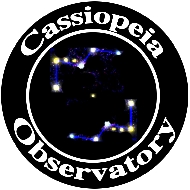
SOME THOUGHTS ON LIGHT POLLUTION & LIGHT NUISANCE
Posted: 8 November 2011
I have decided to collect some of my thoughts on Light Pollution and Light Nuisance. Having lived near Los Angeles and now in Arizona, I have some experience with the effects of light pollution and the nuisance that incorrect lighting can be. What follows are my opinions, although as can be seen on the "LIGHT POLLUTION ARTICLES & REFERENCES" page, improper lighting is getting increasing attention from individuals, organizations, and even governments. Fighting Light Pollution is no longer just a battle being waged by astronomers. Many doctors, educators, journalists, and even politicians now recognize the dangers and wastefulness of improper lighting.
People can light up their property (and they do). That is their "right". What they should NOT do is have that light visible beyond their property line. Whether it is up, down, or sideways, their lighting and its effects should not be brightly seen from outside of their property. If people did that, all lighting complaints would go away and light pollution from residential and business sources would be significantly reduced.
People do have good reasons for leaving an outside light on at night, whether for safety or convenience. Tom Bodett made that famous with his Motel 6 "We'll leave the light on for you" phrase. But leaving a light on doeesn't mean it has to be a bright light or one that blinds anyone walking or driving by.
One reason for lighting up property at night seems to be going away. Security alarm companies are advertising that most home break-ins are now occurring during the daytime. Yes, that is because the residents are more likely to be away during the daytime. But if the daytime light doesn't prevent break-ins, why would lighting up property at night deter the jerks? So, night-time lighting just brings a false sense of security. And even worse, it provides light for the jerks to do their work, without needing to bring their activities to "light" by using flashlights, which would attract attention. Motion detection lighting is more effective than lights that are on all the time. Just make sure it is not triggered by vehicles passing on the road outside your property. But regardless of the type of lighting used, it should be directed where is makes sense. Lighting up your neighbor's house (or observatory) is not an effective utilitization of your light. Money can be saved by pointing the light where it should go and shielding it to prevent wasted light from shining elsewhere. If you don't like to save money, then contact me; I can make use of that extra money that you could have saved.
Driving around during the daytime, I see many residences and businesses with exterior lights still on. Why is it necessary to leave a porch light or security floodlight on during the daytime? It may not create light pollution or be much of a light nuisance during the daytime, but it does cost money and wastes energy. Home owners and businesses could save a lot of money by turning off unnecessary lighting day and night. Businesses could even pass those savings on to their customers or increase their profits. Why would a business NOT want to do that? Think about all the office buildings that are not occupied at night yet have floor after floor with lights shining out through the windows. What a waste of resources and money. So, Mr. CEO and Ms CFO, turn off your lights and use your light pollution reduction efforts as a marketing tool.
Of course, I'm airing these thoughts as an amateur astronomer who enjoys the night sky. Other people have other interests and could care less what's to be seen in the sky. That's OK. If they enjoy outings in their backyard at night, they probably want some light. And that's OK too. But do they really want to light up their neighbor's backyard as well? When that light is unwanted, it becomes a light nuisance. A stereo system being played so loudly that it becomes a "sound nuisance" can result in a visit from local law enforcement. Similarly, light nuisance should be treated the same way. So, when you mount a new light, consider where it is pointed. When you next turn on an outdoor spotlight, think about who can see that light and whether they WANT to see it. Use shielded lights and bulbs of just enough wattage to do the job.
So, you still say "who cares?". Well, you might care even if you don't realize it. Science is beginning to realize that humans have health reasons to care about the night. A new study has determined that light pollution in Los Angeles affects air quality. The excess lighting is hampering some chemical reactions that would otherwise cleanse the air naturally. Here in Arizona we have scorpions. Most people don't care to have them in their house. But yet they have bright external lights turned on and bugs are attracted to those lights. And the scorpions are then attracted to the bugs. Cause and effect. And just as animals are affected by night lighting (it messes up their sense of direction), people are affected as well. The brain uses periods of darkness to heal the body. Without darkness, the brain can't do that. And now we are learning that night lighting may even be a factor in causing breast cancer. Who knows what other human ailments may be caused by light pollution. So, the next time you "light up" think about that. Turn it off and you may end up saving a life.
Turn off, save money, be a good neighbor, and save lives. It works for me. It will work for you too.
Go to the ETX Home Page.
Go to the Cassiopeia Observatory Site.